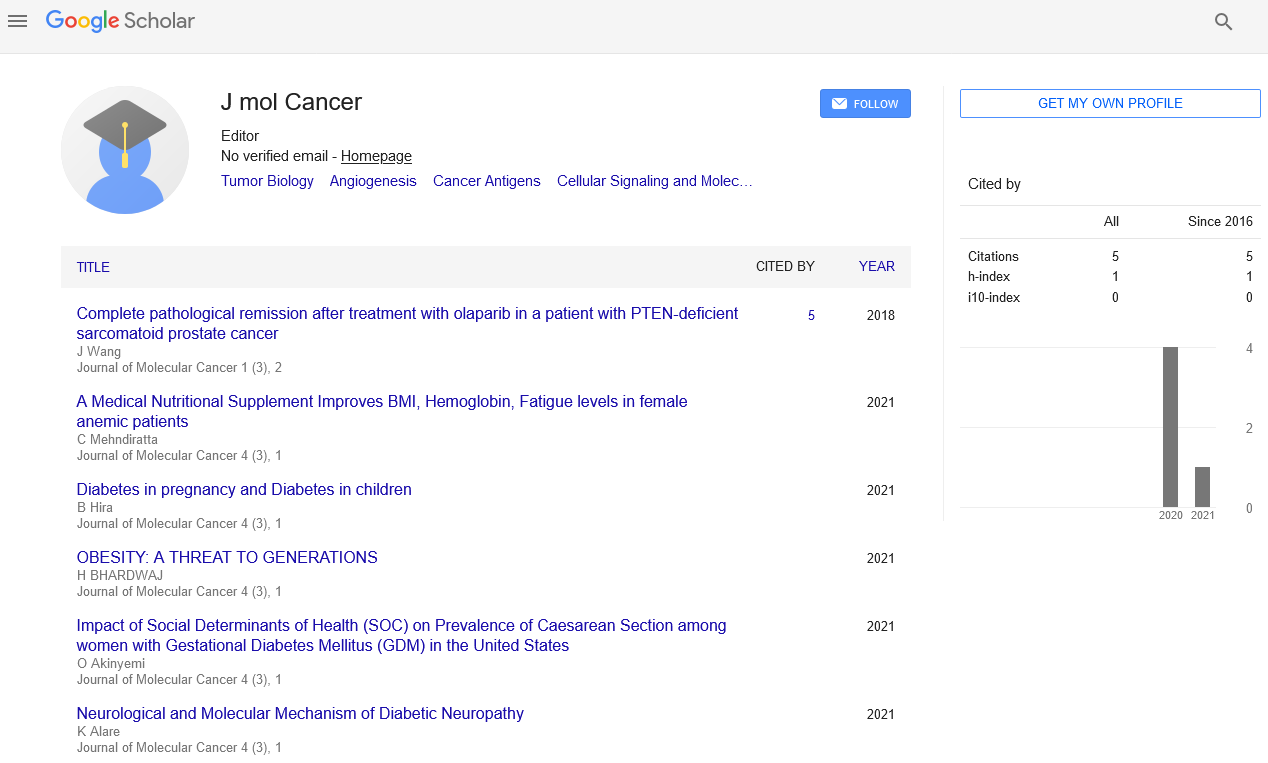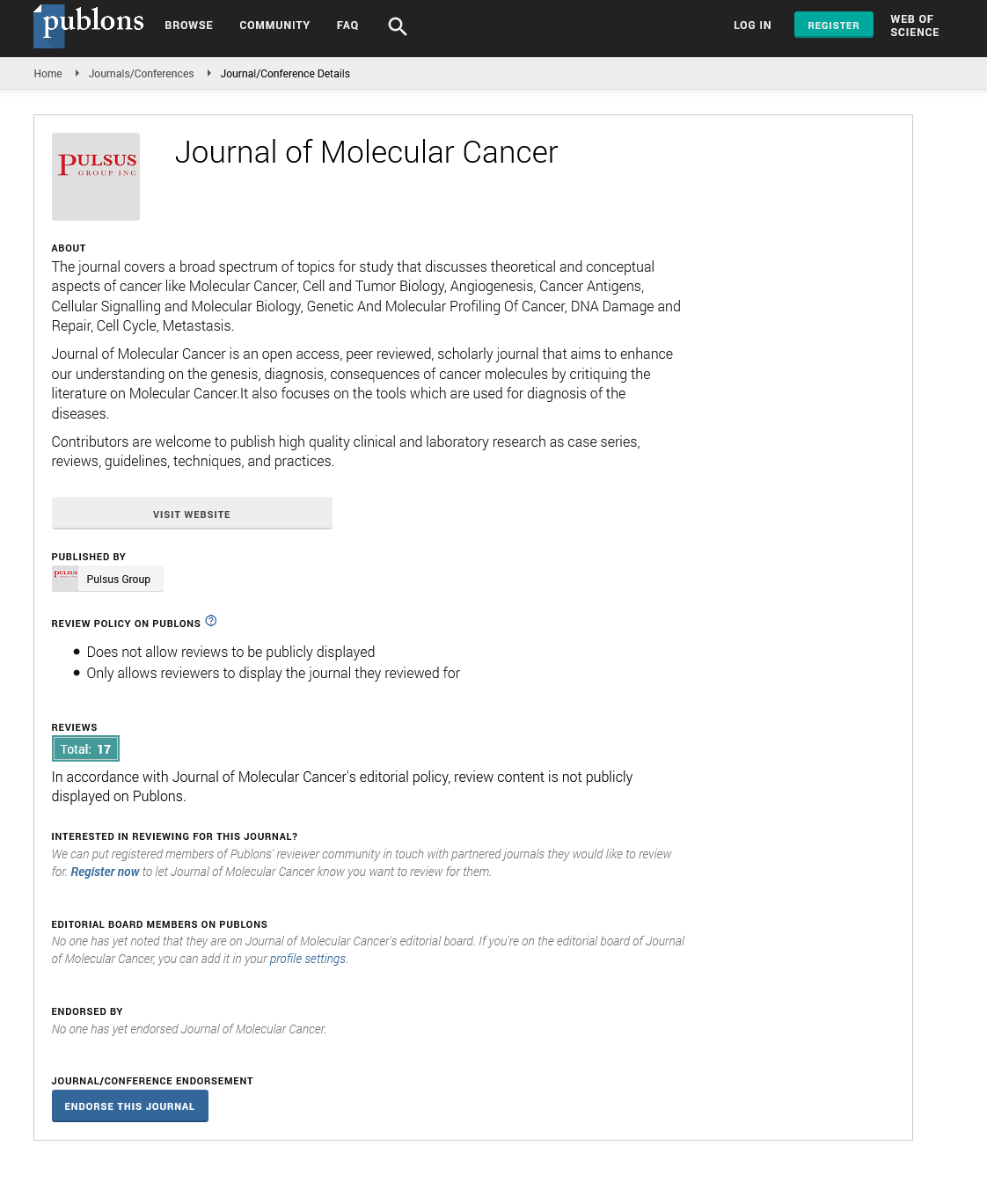Epigenetics: Unraveling the complexity of gene regulation and disease
Received: 20-Mar-2024, Manuscript No. puljmc-24-7162; Editor assigned: 22-Mar-2024, Pre QC No. puljmc-24-7162; Accepted Date: Apr 25, 2024; Reviewed: 09-Apr-2024 QC No. puljmc-24-7162; Revised: 17-Apr-2024, Manuscript No. puljmc-24-7162; Published: 27-Apr-2024
Citation: Rodgers R. J. Epigenetics: Unraveling the complexity of gene regulation and disease. J Mol Cancer. 2024; 6(2):1-2.
This open-access article is distributed under the terms of the Creative Commons Attribution Non-Commercial License (CC BY-NC) (http://creativecommons.org/licenses/by-nc/4.0/), which permits reuse, distribution and reproduction of the article, provided that the original work is properly cited and the reuse is restricted to noncommercial purposes. For commercial reuse, contact reprints@pulsus.com
Abstract
Epigenetics is a rapidly evolving field that explores how gene expression is regulated without altering the DNA sequence itself. This complex layer of genetic control involves modifications such as DNA methylation, histone modification, and RNA-associated silencing. Understanding epigenetics has profound implications for various biological processes, including development, aging, and disease. This article delves into the fundamental concepts of epigenetics, its mechanisms, and its impact on human health and disease. By examining recent advances in the field, we highlight how epigenetic research is transforming our understanding of gene regulation and its potential applications in medicine.
Key Words
Epigenetics; DNA methylation; Histone modification; Gene regulation; RNA silencing; Genetic disorders; Precision medicine
Introduction
Epigenetics is a field of study that explores how gene expression can be altered in heritable ways without changing the actual DNA sequence. This discipline has fundamentally transformed our understanding of gene regulation, uncovering new dimensions in how genes are activated or silenced, and how these changes impact development, disease, and potential treatments.
The concept of "epigenetics" is rooted in Greek, with "epi" meaning "above" and "genetics" pertaining to the study of genes. It refers to a variety of mechanisms that modify gene activity through modifications that do not involve changes to the DNA sequence itself. These include DNA methylation, histone modification, and the action of non-coding RNAs. Such modifications can be either stable and inheritable, affecting gene expression across generations, or dynamic, adjusting to environmental changes and influencing cellular processes.
One major epigenetic mechanism is DNA methylation, which involves adding a methyl group to cytosine residues in the DNA sequence, often at CpG dinucleotides. This addition can suppress gene expression by making the DNA less accessible to the transcription machinery. The patterns of DNA methylation are established during an organism’s development and can be altered in various diseases, such as cancer. Abnormal DNA methylation can result in the silencing of tumor suppressor genes or the activation of oncogenes, thus contributing to cancer development.
Histones are another crucial component in epigenetic regulation. These proteins around which DNA is wrapped form a structure known as chromatin. Post-translational modifications of histones, including acetylation, methylation, phosphorylation, and ubiquitination, play essential roles in regulating gene expression. These modifications can either loosen the chromatin structure, making genes more accessible for expression, or tighten it, leading to gene silencing. The so-called "histone code" refers to the distinct patterns of these modifications that influence chromatin structure and, consequently, gene activity.
Non-coding RNAs, such as microRNAs (miRNAs) and long noncoding RNAs (lncRNAs), are also vital in regulating gene expression. miRNAs function by binding to messenger RNAs (mRNAs), leading to their degradation or inhibiting their translation, thus regulating gene expression after transcription. lncRNAs can affect gene expression through interactions with chromatin-modifying complexes or by influencing the transcriptional machinery directly. These RNA molecules are significant in the regulation of gene activity and have implications for various diseases.
Epigenetic alterations are notably important in the context of cancer. Variations in DNA methylation patterns and histone modifications can contribute to cancer by activating oncogenes or silencing tumor suppressor genes. For instance, hypermethylation of promoter regions can lead to the silencing of genes that normally inhibit tumor growth. Furthermore, epigenetic changes can influence drug resistance and contribute to the heterogeneity observed in cancer, complicating treatment approaches.
Several genetic disorders are linked to epigenetic changes. Conditions such as Prader-Willi Syndrome and Angelman Syndrome arise from abnormalities in imprinting, a type of epigenetic regulation where gene expression depends on the parent of origin. Other genetic disorders, including Rett Syndrome and certain congenital diseases, are associated with mutations in genes involved in regulating epigenetic mechanisms. Additionally, epigenetic modifications play a role in aging. Changes in DNA methylation and histone modifications over time can alter gene expression patterns, contributing to cellular aging and age-related diseases. Research into these age-related epigenetic changes holds promise for developing strategies to promote healthy aging.
The potential of targeting epigenetic modifications for therapeutic purposes has become an exciting area of research. Epigenetic drugs, including DNA methyl transferase inhibitors and histone deacetylase inhibitors, are being developed to correct abnormal epigenetic changes associated with diseases such as cancer. These therapies aim to restore normal gene expression patterns, offering hope for improved treatment outcomes and new therapeutic avenues.
In summary, epigenetics offers profound insights into how gene expression is regulated beyond the genetic code itself. It reveals mechanisms by which gene activity can be controlled stably or dynamically, impacting development, disease progression, and treatment. With ongoing research, the potential for epigenetic interventions to address a variety of health conditions continues to expand, promising advancements in personalized medicine and therapeutic strategies.
Conclusion
Epigenetics has transformed our understanding of gene regulation and its implications for health and disease. By exploring the mechanisms of DNA methylation, histone modification, and noncoding RNAs, researchers have uncovered how gene expression is controlled and how deviations from normal epigenetic patterns contribute to various conditions. The field of epigenetics holds great promise for advancing personalized medicine, developing new therapies, and improving disease prevention strategies.
As research continues to unravel the complexities of epigenetic regulation, the potential for translating these discoveries into clinical applications will grow. Epigenetic approaches are set to play a crucial role in the future of medicine, offering new avenues for diagnosing, treating, and preventing diseases with greater precision and efficacy. Understanding and harnessing the power of epigenetics will be essential for advancing our ability to address complex health challenges and improve patient care.






